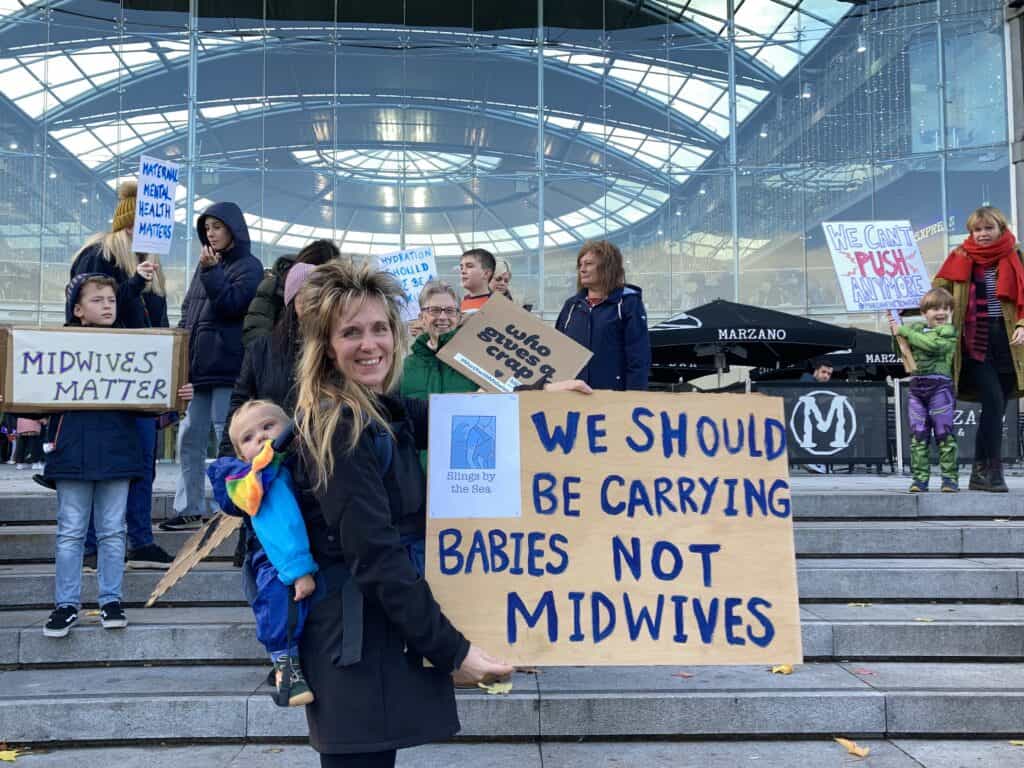by Tracy Sealey

I have a confession to make. I am a doula and an antenatal teacher but I am done talking about the medicalisation of childbirth. DONE! For years, we’ve been locked in this endless, circular debate about whether childbirth should be “natural” or “medical,” and it’s getting us nowhere. All we’re doing is wasting time, arguing over personal birth choices while the real enemy—the systems and institutions that control these choices—gets off scot-free. It’s infuriating to see how deeply we’ve been distracted, how much energy we’ve poured into these debates, instead of turning our collective outrage on the systems that consistently fail women and birthing people and those who care for them.
Let me be absolutely clear here: when I talk about systems and institutions, I am not talking about the doctors, midwives, or healthcare professionals on the ground. I believe that most of these people go into their jobs wanting to help and care for women and birthing people. But they’re trapped, just like the rest of us, in a broken system that leaves them overstretched, under-resourced, and demoralised. And to make matters worse, they are constantly criticised simply for following the guidelines they are required to uphold. These professionals are not the problem—they are victims of the system, too. The real blame lies with successive governments who have failed to invest properly in maternity care or grapple with the enormous challenges it faces.
The Pointlessness of the Medicalisation Debate
Medicalisation is the process of taking a normal, physiological event and turning it into a clinical, medicalised procedure. That sounds terrible, right? But here’s the thing: it’s not that simple. Medical help isn’t inherently evil. It can save lives. It can save babies and mothers. For some people, having access to interventions like epidurals or C-sections is essential or simply their preference – and that’s okay. And yet, we’ve been duped into thinking that the real problem is the medicalisation of birth itself, rather than the system that restricts our choices and leaves so many people traumatised, no matter how they give birth. I’ve seen it happen time and again. Some people strive for a “physiological” birth, while others prioritise pain relief or medical safety. And for every person who’s traumatised by an unnecessary intervention, there’s another person who’s traumatised because they didn’t get one in time. Birth is not black and white. It’s messy, it’s full of trade-offs, and it’s often impossible to know whether the “right” decision was made. Induction is a perfect example. Induction might save a baby’s life, but it might also introduce risks. If that baby is born in poor condition after an induction, who’s to say what caused it? Was it the induction itself? Or is the baby’s condition just proof it was necessary? It’s impossible to know, and we are wasting time arguing about it instead of looking at the bigger picture.
Instead of fighting over individual choices, we should be fighting for real change; better options and more of them!
The Real Enemy: Systems and Institutions
The real problem isn’t medicalisation. It’s the systems and institutions that force people into narrow, limited pathways during childbirth. I was recently told a story about a birth in The Netherlands, where the importance of good maternity care is understood. It was an induction, yes—but it looked completely different from what that experience would be in the UK. She had her own private room, her partner had a proper bed to rest on, and the staff were compassionate, well-supported, and well-trained. She even had access to a mobile epidural, telemetry, and a birthing pool. Imagine that: continuous monitoring, excellent pain relief AND the comfort of water during an induction. Unheard of!
In the UK, women are crammed into noisy wards, waiting hours, or even days, for proper care because the staff are overworked and stretched thin. Epidurals and monitoring? Sure, but good luck getting access to a pool or even a spacious comfortable room that supports mobilisation and oxytocin release at the same time. My local trust has a fantastic midwife led unit. Large rooms, pools, comfy double beds, mood lighting, birth balls and mats, access to a private garden and even a ceiling hook for a rebozo. Amazing right? Until you find out that only 15% of the people birthing there actually get to use it. If you want or need continuous monitoring, induction or augmentation of labour or an epidural you have to go to the obstetric unit which has none of these comforts. This leaves the majority in a predicament. Either they birth ‘outside of recommended guidelines’ with all the anxiety and hassle that goes with it, or they accept the recommendations of their doctor knowing that they will be denied the very things which are evidence-based to support the physiological process (and they are probably the ones that need it most).
Women and birthing people are suffering because the system asks them to make choices they shouldn’t have to make. And healthcare professionals have their hands tied. When things go wrong, they face real and serious consequences. In a system this broken, those who work in it are left to operate in fear, following rigid protocols rather than offering personalised care. And then they get blamed when things don’t go according to plan, even though they’re often doing the best they can with limited options and overwhelming pressures.
The Absurdity of the “Natural” vs. “High-Tech” Debate
Moral value is attached to terms like “natural” and “normal” when it comes to birth. On one side ‘natural’ birth is glamorised and medical intervention demonised. Then, on the other side, you’ve got people rolling their eyes and calling anyone who wants a home birth reckless or naive. We’re busy pointing fingers at each other while the system crumbles around us. If someone wants a physiological birth, they should be supported to have one, full stop. But the reality is, that people are being forced into making what are often perceived as extreme decisions just to avoid potential trauma. And then they’re judged for it. Meanwhile, those who choose medical interventions are judged too—painted as weak, scared, gullible or uneducated, when all they want is to feel safe or reduce their pain. Why are we doing this to each other? We shouldn’t be fighting amongst ourselves when it’s the system that’s making birth harder, scarier, and more traumatic than it has to be.
Enough with the Guilt and Blame
The constant finger-pointing needs to stop. No matter what someone chooses, they get judged. If their birth goes well, they were “lucky.” If it goes wrong, it’s somehow their fault for making the “wrong” choice. Or maybe it’s their doctor or midwife who gets the blame. This isn’t just unhelpful; it’s toxic. It leaves women and birthing people wracked with guilt and self-blame or possibly angry and distrustful of healthcare professionals, struggling with mental health issues, and feeling like failures. And so the vicious cycle continues. We need to stop blaming individuals for outcomes that are, in large part, out of their control. This blame culture distracts us from the real enemy—the flawed system that continues to let people down, again and again.
Why Aren’t We Asking the Right Questions?
Take freebirth, for example. Freebirthers are often portrayed as irresponsible or extreme, but it’s rarely asked why so many women are choosing this path. Many freebirthers aren’t making some wild, reckless choice—they’re choosing freebirth because they’re terrified of entering a system that many see as abusive. And honestly, I don’t blame them. Instead of condemning them, we should be asking what it would take to make them feel safe engaging with the system and working together to fix the problems. Doulas, midwives and obstetricians need to stop the infighting, step outside their own echo chambers and engage in meaningful dialogue with a genuine desire to learn from each other and work together to improve the experiences of all women and birthing people.
It’s Time for Change
We need to stop talking about birth choices as if they exist in a vacuum. We need to start talking about the systems that restrict those choices and cause harm. This is about more than just a debate about epidurals versus home births. It’s about demanding better. We need more midwives, better pay, and proper support for healthcare professionals. We need bigger, better facilities, more pools, more theatres and more private rooms. We need telemetry monitors that actually work and enough staff to make sure everyone is cared for properly. And we need to stop accepting this broken system as the status quo. This isn’t about ideology or birth politics. It’s about making sure that everyone—no matter what choices they make—gets the care, respect, and dignity they deserve. It’s about ending the cycle of guilt, blame, and division, and uniting to challenge the real problem. Because until we do, nothing is going to change.


A really interesting post Tracy, very clearly describes the sad situation we are in. Moving forward tho’ how do we look to making the necessary changes?
Brilliant. The NHS is stretched to breaking point. Staff and users are being short charged. It was an institution designed to promote health and well being and medical care at the point of need . Cradle to Grave. What we have now is a disjointed system that meets the holistic needs of the very few.
A complete overhaul is required. More funding, definitely . ‘Thinking outside the box’ in terms of meeting holistic medical care and also support of the staff practising within it.
More staff, improved staffing levels
Better pay
Return to making education/training free.
Attract the right people with special skill sets.
Open and transparent HR and management
Reduce litigation by open and transparent access to debriefs and compensation if necessary.
Free 24 on site childcare for those who need or wish to access it.
Meaning more staff are able to return to work and to feel supported.
I havd many other suggestions but they are top of my list.
Retired midwife
Tracey, this is so true. A really well argued piece. Couldn’t agree more